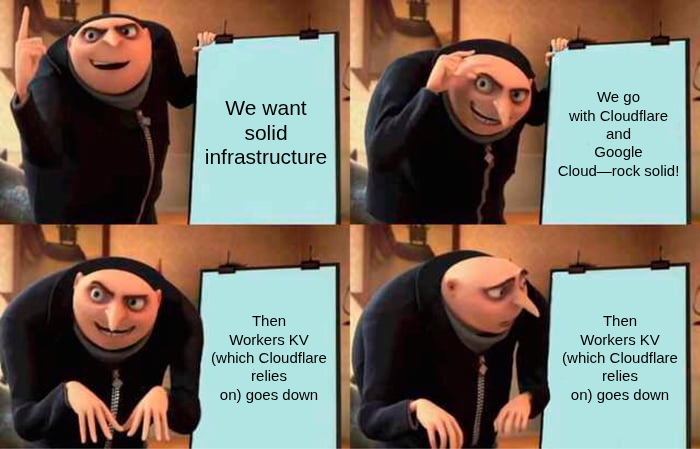Picture this:
You’re chilling on your couch, watching Gordon Ramsay absolutely destroy yet another poor soul on Hell’s Kitchen, when suddenly—ding!—a Slack ping or a frantic phone call:
“Everything’s down! Nothing’s working!”
That’s probably what thousands of devs and sysadmins experienced last night: services crashing left and right, Downdetector glowing red like a Christmas tree, and a general sense of chaos settling in.
The usual suspect
And the finger quickly pointed at… Cloudflare.
And with good reason: websites, apps, APIs—the internet itself—started falling over in domino fashion. Big names like Spotify, Twitch, Discord, YouTube, OpenAI, Shopify, and even parts of Microsoft and Google went dark. At first glance, it looked like a major cyberattack or a critical exploit spreading like wildfire.
But nope.
A glitch hiding another glitch
The root cause? A very specific Cloudflare service: Workers KV, a distributed key-value storage system heavily used in their serverless infrastructure.
The catch? It partly relies on—drumroll—Google Cloud. And yesterday, a hiccup in Google Cloud’s storage or auth systems lit the match.
The result? Up to 90% of requests to Workers KV failed, triggering cascading issues for anything depending on it.
To their credit, Cloudflare didn’t just play the blame game. In a refreshingly honest post-mortem, they owned up to their architectural choices, admitting they lacked the necessary resilience to handle such a scenario. Translation: outsourcing a critical piece of your infrastructure without a proper fallback can—and eventually will—burn you.
A fragile balance
Moral of the story? As much as modern life runs on the internet, the internet itself runs on a shockingly small set of interconnected services. And when one of those goes down, the ripple effect is massive.
Your site might be hosted “somewhere else,” sure—but if your CDN, auth, API, or cache goes through Cloudflare, you’re along for the ride whether you like it or not.
So yeah, Gordon Ramsay might’ve been screaming last night too…
But probably because he couldn’t load Spotify either.
And if you want to dig deeper, check out our short take on Firefox’s dependency on Google

